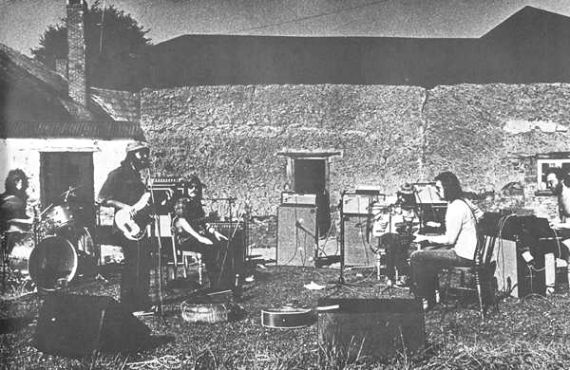|
|
|
|
Welcome to part 2 of Chris Kelly's interview with Ray Jackson. It completed exactly 18 months after part 1. Let's hope it doesn't take another year-and-a-half to finish the concluding part 3. [RG]
The first Lindisfarne Live Album was never a popular album with Alan. I personally thought it had the best live rendition of MMOTC and "No Time to lose" of all the live albums. What were your thoughts.
It wasn't popular with any of the band, although Alan had his own reasons for not wanting it released. It was recorded as part of a soundtrack for a rockumentary and was not intended to be released as a live album. I remember it being only an eight track recording, half of the tracks were used for sound signals to sync with the film. The stereo sound quality was poor but I suppose it was okay for mono television broadcasting at that time.
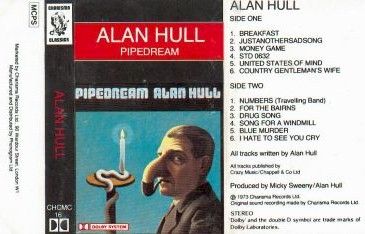 After we split in 1973 Charisma were desperate to cash in on our popularity as no unreleased studio tracks were available. To satisfy demand, they released the film soundtrack as a live album much to our dismay and particularly to Alan's. Charisma had just released his first solo album
Pipedream a few weeks earlier and he was bitterly disappointed to learn of the timing of this rogue release as it split the market for our product and robbed him of potential sales.There is no doubt in my mind that Pipedream would have been more commercially successful had it not been for this move by the record company.I have not played the Lindisfarne Live album since it was released,I do not posses a copy and therefore cannot comment on any of the tracks.
After we split in 1973 Charisma were desperate to cash in on our popularity as no unreleased studio tracks were available. To satisfy demand, they released the film soundtrack as a live album much to our dismay and particularly to Alan's. Charisma had just released his first solo album
Pipedream a few weeks earlier and he was bitterly disappointed to learn of the timing of this rogue release as it split the market for our product and robbed him of potential sales.There is no doubt in my mind that Pipedream would have been more commercially successful had it not been for this move by the record company.I have not played the Lindisfarne Live album since it was released,I do not posses a copy and therefore cannot comment on any of the tracks.
Then the Australia tour, from what I have read it seemed doomed from the beginning and Alan seemed to have made his mind up that the band would split before you all went. Was that apparent at the time ?
Alan was unhappy constantly touring with the band and wanted to concentrate more on writing. He had suggested at a meeting prior to
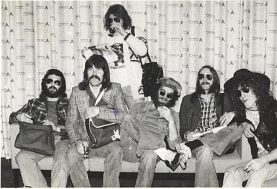 us leaving for
Australia and Japan that he wanted to be a part time member. There was not a set plan of how this could be achieved but it would have involved recruiting another member
to take over when Alan wanted a sabbatical. The arrangement probably would have worked had it not been for other factions in the band who were pulling away from the mainstream style. I think we were all guilty in being bored with the music we had created.
us leaving for
Australia and Japan that he wanted to be a part time member. There was not a set plan of how this could be achieved but it would have involved recruiting another member
to take over when Alan wanted a sabbatical. The arrangement probably would have worked had it not been for other factions in the band who were pulling away from the mainstream style. I think we were all guilty in being bored with the music we had created.
We started the tour feeling the failure and disappointing performance of the Dingly Dell album. It had not received the critical acclaim that was awarded the first two albums. This was reflected in the sales which were poor in comparison. We were also not happy with the production or the engineering of this album. It lacked bass end on the finished disc but to us it had sounded okay on the studio monitors at mix down. No amount of pleading with the record company to withdraw it was heeded or to remix the sound.
The morale of the band was far from optimistic. We had started to clash about what direction the music should take next and after six weeks spent on tour in close proximity with each other, the damage was done. After a night of pretty heavy drinking in the Tokyo Prince Hotel at the end of the tour we decided for the moment we had had enough and words were not held back.
We were advised by many who were close to us to reconsider our future and take a year out. Genesis had done just that and had become much enriched in songs and performances because of it. Sadly for us the constant touring had eventually got to us all, not just Alan. The things that had been said, could not be easily taken back. What happened next is well documented.
Did you have a family to support at this time?
No not when the split occurred. It was not until Lindisfarne II had formed that my first child was born.
1973 was a big year on the British Music scene. Lots of major albums such as Pink Floyd's 'Dark side of the Moon' and 'Band on the Run' by Paul McCartney's Wings. The birth of 'Glam Rock' towards the end of 1972 etc. How did you feel after the split and did you think it was unfortunately timed?
My thoughts were on recruiting new members to the band with Alan after the original line up had faltered. I was much more interested in the recording of Roll On Ruby to worry about past decisions at that particular moment in time.
How did the members of Mk2 come together? Had they been friends of the band etc?
We had all known each other for many years. A healthy group scene had developed in Newcastle in the mid sixties and all of us had played on the same bill at various venues, allowing us to get first hand experience of bands playing abilities and spotting the talented ones.
The Mk II line up was to be the aftermath of Alan's Pipedream
sessions,
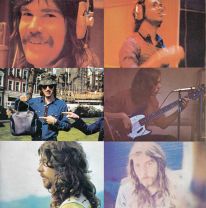 featuring the late
Kenny Craddock (keyboards/guitar) along with Colin Gibson
(bass), Johnny Turnbull (guitar) and Ray Laidlaw
on drums. The sessions had gone well and we had built a good sound together. We thought Ray was going to stay with the line up, but at the last minute, decided to team up with his old North Shields buddies Rod and Si, to form Jack The Lad. This was a disappointment as Colin and Johnny were not able to form a group with us either due to other commitments.
featuring the late
Kenny Craddock (keyboards/guitar) along with Colin Gibson
(bass), Johnny Turnbull (guitar) and Ray Laidlaw
on drums. The sessions had gone well and we had built a good sound together. We thought Ray was going to stay with the line up, but at the last minute, decided to team up with his old North Shields buddies Rod and Si, to form Jack The Lad. This was a disappointment as Colin and Johnny were not able to form a group with us either due to other commitments.
The transition was not as smooth as we had hoped but undaunted Alan, Kenny and myself eventually got together a suitably talented line up of Newcastle musicians. Charlie Harcourt was plucked from a band in the states called Catmother and The All Night News Boys, based in Texas. He had learnt some great guitar licks over there and complemented the guitar styles of Alan and Kenny.
Bass was filled by Tommy Duffy who had played in Bell and Arc and Newcastle band The Sect. Paul Nichols was recruited on drums, he had played with Kenny and Tom and latterly in the band Sandgate.
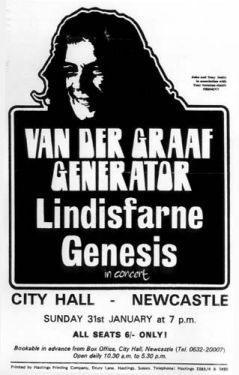 During our search for a drummer, we came up with the idea of asking
Phil Collins to join when Ray Laidlaw dropped out. We both had known Phil quite well from the
Six Bob Tour days and thought we may be able to coax him out of Genesis. Phil was playing in a scratch band at the time, (can't remember the name of it now) but I think Julie Tippet was one of the front line. He did this to keep his hand in when Genesis were not on the road. I'd seen him play with this band at a pub in West Kensington and the music differed a great deal from that of his core group. It was quite jazzy and was of a similar direction to the style Alan and I thought Lindisfarne should go.
During our search for a drummer, we came up with the idea of asking
Phil Collins to join when Ray Laidlaw dropped out. We both had known Phil quite well from the
Six Bob Tour days and thought we may be able to coax him out of Genesis. Phil was playing in a scratch band at the time, (can't remember the name of it now) but I think Julie Tippet was one of the front line. He did this to keep his hand in when Genesis were not on the road. I'd seen him play with this band at a pub in West Kensington and the music differed a great deal from that of his core group. It was quite jazzy and was of a similar direction to the style Alan and I thought Lindisfarne should go.
A meeting was set up around the corner from the Charisma office in a restaurant off Regent Street behind the Royal Academy. It started early in the evening and finished quite late. I remember the meeting being fueled with some alcohol but by the end of the night we had persuaded Phil that we were the band he should be in. We saw Phil off in a cab and Alan and I were elated as we got in our cab to go home. Alas the following day, we had a call from Phil to say that he had been given a strong lecture by record company boss Tony Stratton Smith when he mentioned his intentions. Strat said he should stay with Genesis. I think Strat was totally against the move, mainly because he did not want two of his most popular bands splitting simultaneously and damaging the record company. His argument must have been pretty persuasive and as a result Phil declined our offer. Our search for a drummer was still on but what a pity for us that he changed his mind.
Did you find that this was a particularly creative time for you personally with the Mk2 line up?
I found it more liberating in musical terms. The band had two new writers in Kenny and Tom and the direction of the band was much more rocky and adventurous.
This was obviously the inspiration I needed as it was at this time that Charlie Harcourt and myself started collaborating on songs and forming our own writing partnership. Sadly the bands line up did not last long enough for them to be performed or recorded. It wasn't until the old Lindifarne line up reformed that they were to be recorded for Back & Fourth, The News etc.
Is it true that members of the band became window cleaners for a while?
I don't know where you got that info from, but yes it was true in my case. After Lindisfarne II broke up I had two young kids and a wife to support. For a short period to make ends meet, I took on a window cleaning round and did some decorating in the wilds of Northumberland.
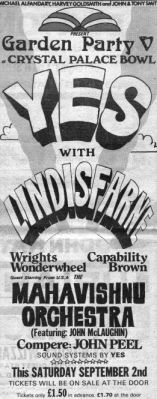 How long did MK2 last and what happened in the end?
How long did MK2 last and what happened in the end?
The band did one tour of the USA supporting mainly Traffic, YES, and a few gigs with Joe Cocker, The Kinks and The Beach Boys. We also toured Europe and Scandinavia and did one trip to Australia and New Zealand. The band lasted only two and a half years and in that time recorded two albums, Roll On Ruby on Charisma and Happy Daze on Warners.
We did not have the success that the first band had enjoyed, perhaps it was the fact that the new music was so different from the old style. We were received favourably in America but we didn't sell records in great numbers. Alan had become disenchanted with touring and as a result decided to leave and the band had to fold in the end.
Alan and I did not part on very good terms as he seized all of the equipment with the exception of my Mandolin and Harmonicas. Debts had built up and I was served a writ for unpaid VAT, which I naively thought was being taken care of by our then management company.
Our very last gig was performed at Leicester University in early 1975. I was unable to play again until I met Barry McKay in 1976 who funded me some new back line gear and a PA and I then signed to him for management. Barry was eventually to bring the original line up back to the stage at the Newcastle City Hall in late 1976.
[Derek Walmsley asked about your collaboration with Charlie Harcourt]
Im interested in hearing how the duo composed such gems as Warm Feeling, Winning The Game and When It Gets The Hardest, all very effective both live and in the studio.
- What was their approach- who wrote the lyrics/music ?
- When did they start/stop their songwriting collaboration and how many songs resulted?
- Were any songs being written at the time of the Lindisfarne Mk.II band ?
- Was there a stockpile of compositions not used by Lindisfarne or for Jackas solo work?
- Were any offered for the later Lindisfarne albums Dance Your Life Away and Amigos?
With regard to mine and Charlie Harcourt's approach to song writing, it developed naturally during our time with the Lindi II's. We were always playing about musically during rehearsals trying out chord sequences and melodies. This happened usually when Hully and Kenny Craddock etc. went off to the pub for an hour or so. Some of the ideas would stick in our heads and we would come back to them later. I bought around that time, a portable stereo cassette player and started recording the music to listen to later in the car or at home.
Sometimes words would come from these musical jottings and be added to and tried out between us on a 2 track Revox reel to reel. We carefully added track on track until a band sound was acheived, all be it in what now would be deemed, a very primitive form of recording. Sometimes I would get words and a tune together in my head at the most inconvenient of times but had to drop everything and get the words jotted down before they were forgotten. Many a good idea got lost if I didn't.
Charlie and I would meet up a few times a week mostly in his flat and we would work on some of these ideas. Warm feeling started as a guitar piece and I came up with the words to add to it. The chorus was the sticking point as it originally didn't have one in the traditional sense. It wasn't until around a year or so later that it suddenly came to me in the middle of the night and I had to get out of bed to write it down. Some songs would take an age to complete but others would just come right out of the blue and present themselves without much work. Charlie and me had started recording these together in a demo studio when we thought they were ready.
The musicians who we brought in for the sessions eventually formed the nucleus of a band and we were able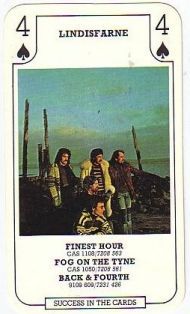 to fine tune the songs even more. I mostly wrote the words and came up with the tune and Charlie would arrange and suggest interesting arrangements, middle eights and riffs etc. Most of the instrumentation on the demo's would be done by him and I would record the vocals and mouth parts.
to fine tune the songs even more. I mostly wrote the words and came up with the tune and Charlie would arrange and suggest interesting arrangements, middle eights and riffs etc. Most of the instrumentation on the demo's would be done by him and I would record the vocals and mouth parts.
After Lindisfarne got back together in 1977-78 to record Back & Fourth Charlie and I found it increasingly hard to find time to write as we had done in the past. The last song we recorded as a demo was Winning the Game which found it's way on to Sleepless Nights around the early eighties.
I did however record a solo album "In The Night" for Mercury with Charlie playing on most of the tracks that we had written together. Sadly it wasn't a hit but it did crystalise our work to its best advantage..
I did come up with various songs for Lindisfarne but they were mostly not considered after Sleepless Nights. Alan was a prolific writer and as a result held sway over much of the choice of songs after that. Hope this answers Derek's questions.
[Steve Foster asked]
"In the beginning, bands tended to be made up of guitar, bass, drums, and/or keyboards, along with someone who could sing. As a mandolin and
harp player, what do you feel most contributed to your being accepted by band mates? Mandy, harp, or vocals? Or?"
My stunning good looks and stage presence, plus I had a PA system.
Why was there a gap of 2 years between the Christmas 76 concert and the Mk 1 reunion?
Quite simple, Alan and Ray were playing in Radiator with Kenny Craddock etc. and I was doing my bit with Harcourts Heroes. Rod was playing with Ralph McTell and none of us were anxious to reform Lindisfarne, that is, until record company interest in a few demo tracks we had recorded in Surrey Sounds studio, was too much to ignore, and an album deal was offered.
'Back and Fourth' , a good title and a good album. What did you think of it?
Great play on words, being our fourth album and getting back together again. It was a nice gap from 73 to 78 for our musicianship and songwriting to mature. We had enjoyed playing with other bands and musicians and brought those experiences to the table to enrich the mixture.
The songs on the whole were pleasant enough and I had for the first time, representation as a songwriter having two songs featured. We had a big single from the album which boosted our confidence and it felt good to be back as a mainstream act appearing on TOTP and other TV shows. The album was at that time the best recorded studio collection we had produced to date and their was some good playing and arrangements on the songs. My only disappointment was that it didn't sell to the americans as much as we would have liked, and we never got to promote it over there.
Was Gus Dudgeon easy to work with?
The late Gus Dudgeon was an old style record producer who had made it from the ranks as a tape op and engineer. He was meticulous in achieving good overall sounds to tape and it was not unheard of for him to take two or three days on getting the right snare sound. It could be quite tedious for the rest of the band while this was going on but it seemed to pay off. However, a lot of his time was spent answering telephone calls during sessions which was frustrating at times, particularly if in the middle of a take. Other than that, Gus was a really nice bloke and mine of stories about other acts and musicians. He was also very funny and had us laughing a lot. He was also good at getting the best performance from you in the studio and would not be afraid to tell you if something wasn't working and suggest another approach.
Was it at this time that Barry McKay became the bands Manager? Did he play a big part in the day to day running of the band?
Barry became manager after promoting both sets of successful concerts at Newcastle City Hall in 76 and 77. He was responsible for attracting interest from major record labels and took over day to day running of the band before the deal was signed with Phonogram. He set up our office in Newcastle above a pub called the Tanners Arms on the Shieldfield end of Byker Bridge. It had quite a lot of space and being out of the city centre had a modest rent. All of our affairs were conducted from there during the late seventies and early eighties.
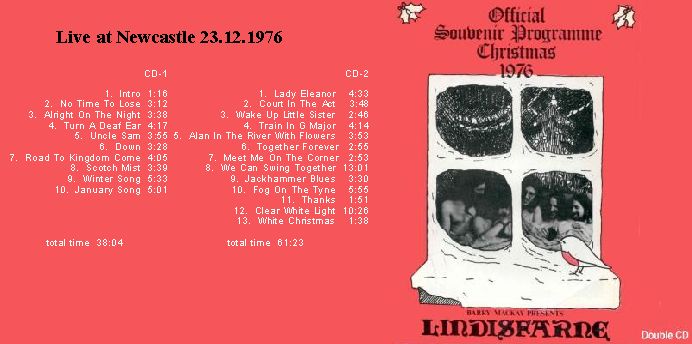
Into the 1980s, and I think it was 3 years between 'The News' and 'Sleepless Nights' . What happened in between and was the band busy throughout?
The band were not happy about being dropped by Phonogram after the News, but just like many other acts around at that period we were all the victims of rationalisation. Our style of music was considered "old hat" as the New Romantics had appeared bearing synths and electronic wizardry. Phonogram and Polydor were about to merge along with Chappel Music and many of their staff were culled as well as a fair proportion of the atistes rosta. There was also a shortage of vinyl and manufacturing costs were rising fast. No record company were interested in signing us so we mainly concentrated on playing live at university and college gigs. We also had the Christmas shows which were going from strength to strength. We did a lot of demo tapes around this period and released a couple of singles on our own label, River Records. Friday Girl was one of them. We played in europe and Scandinavia at various festivals during our albumless period.
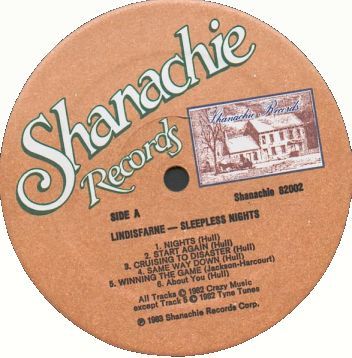 'Sleepless Nights' was a very different album. I thought that the single 'Nights' was a very clever retro piece of work and should have recieved much more acclaim than it did. Where you disappointed that it never charted?
'Sleepless Nights' was a very different album. I thought that the single 'Nights' was a very clever retro piece of work and should have recieved much more acclaim than it did. Where you disappointed that it never charted?
You could say that! I had experienced disappointment after the escape of my solo album two years earlier and then the disappointing sales of Sleepless Nights was an equal blow. There's a lot of effort spent in making an album, and you can't help but build up your hopes for it when you hear it all come together as a finished piece of work. I suppose you become proud of it and you want people to listen to it to get their reaction. When it doesn't sell you start questioning your own talents and abilities. Being in a group was helpful as collectively you help to shrug it off more easily.
Sleepless Nights was produced by Steve Lipson who was also engineer on The News and my solo album. I liked Steve a lot, he had a brilliant musical ear and talent as a guitarist and was into every gizmo around at that time. He knew we had to modernise our sound and encouraged us to buy and use a synth to record with. It gave Sleepless Nights a completely new dimension, but without taking away our traditional sound. I thought the songs on the album were well recorded and performed,I felt it was quite strong overall. It even entered the bottom reaches of the charts without the help of a major record label behind it. We released it ourselves, doing all the marketing and promotion but were not equipped to spend the vast amounts needed to keep plugging it for more than a few weeks and consequently it promptly dropped back out of the charts again.
Also, Lindisfarne added a session Sax player Don Weller. Was this a big departure/ new direction for the band?
We had had a few session players before, particularly on Back And Fourth. Steve Gregory played a sax solo on Make Me Want To Stay. We had dabbled with brass on The News on a few songs also, so I wouldn't say it was a new direction, but a style that had developed slowly. I don't think we had recorded anything quite so rocky as Winning The Game with sax on it, but Wellers contribution lifted the record out of the grooves when it came in. It wasn't long after that when Marty Craggs was recruited to help reproduce various sax solo's live on stage.
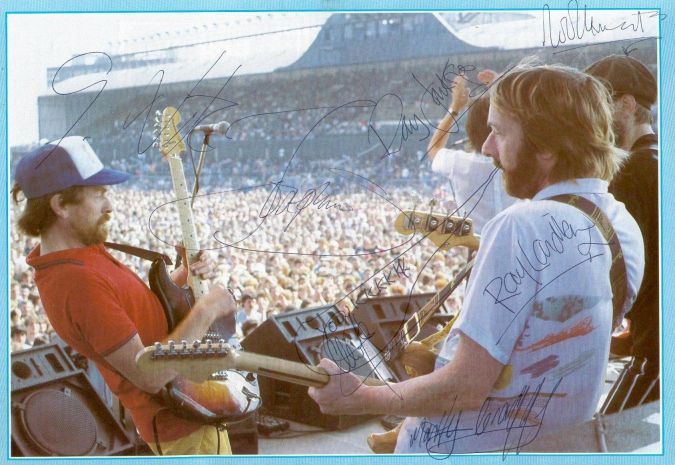
1984 - St James's Park. Do you remember the atmosphere. Any thoughts?
To play on the hallowed turf at St James's Park was an honour in itself but to support Bob Dylan was even more of an ambition. I remember the day being warm and sunny, which is rare for an open air event in the north east. The crowd were behind us all the way and they were warmed up a treat for the man himself to come on stage. It was one of our highest ever paying gigs, where it worked out we were paid something like a hundred pounds a minute.
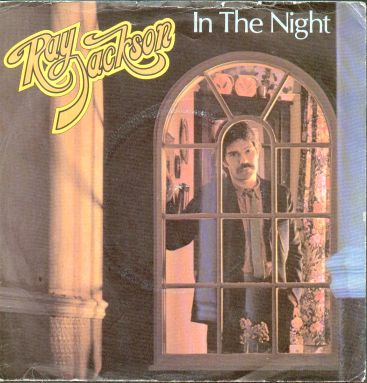 In the Night" are you proud of that album and are there any plans to have it released on
CD?
In the Night" are you proud of that album and are there any plans to have it released on
CD?
A lot of hard work and effort went into the recording of In The Night. It was a very personal statement featuring the style of music I wanted to play and Phonogram records were very kind in supplying me with the resources to do it.
It wasn't my first solo effort of course as EMI had released a single in 1976, Take Some Time, produced then by Muff Winwood at Basing Street Studios. I had a my own band during this period augmented by my song writing partner Charlie Harcourt. We wrote many songs together after Lindisfarne Mk II broke up and with the help of Barry Mckay, were able to form a band and perform them to audiences mainly in the north east. In the process we able to fine tune the songs and eventually go on to secure a publishing deal with Chappel music and then a record release.
After Lindisfarne reformed, the work with my band and Charlie Harcourt was put on hold and it wasn't until after the release of The News that I began to look back at demos that were recorded in 1976-77 and approached Phonogram with the songs. They were keen to put me in the studio and appointed Hugh Murphy to produce an album of the material presented. It turned out to be unfortunate timing though as music trends had moved on and guys like me were deemed old fashioned. The New Romantic period was starting to emerge. Some intervention occurred from recording company execs, during the final stages of the album.
Hugh Murphy and I were asked to compromise and record a number of new songs from other sources to make it sound more commercial to the emerging market, leaving out some of the self penned songs. Regardless of this, I had a great time making the album and some great musicians played on it with me. Today, I feel that some of the performances and the songs are old fashioned sounding. However, there are still a few which stand the test of time quite well. I get the same feeling about The News album both being produced by Hugh Murphy and engineered partially by Steve Lipson.
I would love it to be released on CD but I'm not sure who owns the rights to it now or whether they would deem it worth the cost of re mastering. Needless to say, the album did not recover it's costs, which restricts me from personally purchasing the rights to the original recordings. The costs would have to be paid in full before the tapes were released and that would still probably amount to a substantial sum. So it will languish in the vinyl grooves, probably forever and the tapes left to gather dust in the record company vaults.
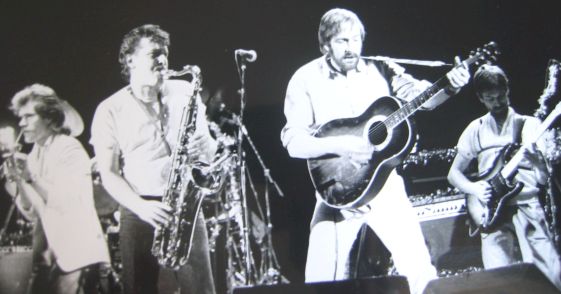
How did the decision to have a Sax player brought into the band happen?
Marty Craggs played sax in Harcourts Heroes and the RJ band. As I mentioned previously, sax featured on a number of songs from Back & Fourth. To reproduce this studio sound on stage more accurately, we called on Marty's wind instrument talents mostly for the Christmas concert tours. He became a permanent member of the band around 1986.
The 1980s saw quite a few Lindisfarne albums: Sleepless Nights, the Lindisfarntastic Albums, Dance Your life away and apparently the most valuable of them, certainly on ebay - C'Mon Everybody. Did you enjoy making that album? Why was the tempo of the re-recorded "Run for Home" not commonly performed and was there any plans to re-release it. DLT used to love playing it on Radio 2?
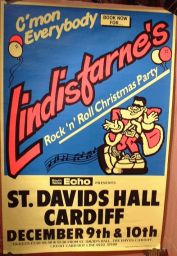 It was great fun making
C'mon Everybody. Most of the songs were favourites from our youth and of course were very influential to us. When the opportunity came to record a bunch of great songs from the fifties and sixties we couldn't resist. We worked the songs as close to the original versions as possible, analysing the arrangements of the instruments to achieve an authentic a sound . The vocals were shared out amongst us to suit the songs. We had a great time singing them and reproducing the backing vocals etc. The re-record restriction had lapsed on Back & Fourth and earlier Charisma recordings and we decided to do new versions of selected songs from our back catalogue, to be included on the album as a double release.
It was great fun making
C'mon Everybody. Most of the songs were favourites from our youth and of course were very influential to us. When the opportunity came to record a bunch of great songs from the fifties and sixties we couldn't resist. We worked the songs as close to the original versions as possible, analysing the arrangements of the instruments to achieve an authentic a sound . The vocals were shared out amongst us to suit the songs. We had a great time singing them and reproducing the backing vocals etc. The re-record restriction had lapsed on Back & Fourth and earlier Charisma recordings and we decided to do new versions of selected songs from our back catalogue, to be included on the album as a double release.
Run For Home was recorded with an electronic snare drum track which ironed out the tempo to give the impression it was faster. I didn't like it much as it lacked the atmosphere of the original. Warm Feeling was given a reggae feel which worked out quite sympathetically and we toured with this arrangement for a year or so.
Clear White Light turned out so much better than the original and benefited greatly from being revisited. The arrangement was cleverly knitted together by Steve Daggett, it is my favourite of all the re-recorded old tracks. The downside of this album however, was the naff cover that was totally inappropriate and which the band had no control over.
I remember being in the Gents at the interval of a Liverpool Empire show when I heard a discussion about the 'Singer' having a day job working for Guinness and I couldn't believe my ears. I'd never heard of a rock star with a day job! What was all that about - why?
Being in a band is great fun particularly when you're playing to packed houses and selling records. Then when record sales dry up and the gigs are less than half full, the economics of everyday life start to confront you. It's not as if you are in a regular job where the money comes in once a month to supplement your bank balance, feed you and pay the mortgage. It's mostly the opposite, there are long periods where nothing comes in at all. I had not written any songs when the band were at their most successful and consequently didn't enjoy the benefits from publishing and performing royalties as an extra source of income. Some bands who have a couple of main writers, insist that all income from publishing and writing be distributed equally amongst its members and share in the success, but this was not the case in our band.
So a disparity of earnings within the group emerged, where one or two were much better off and could survive without performing, or could afford to pursue projects outside of the band. I was not a solo performer as such and needed a band, or at least a couple of backing musicians to perform separately, which was not cost effective. I did not wish to be a slave to the bank manager from one earning period to the next and decided, reluctantly , to take on a job, which would at least cover me financially for part of the year when the band had no touring commitments. I suppose you could liken it to being an actor between parts, the term is resting.
I took a seasonal job with a sports marketing agency as promotional manager, working on sports sponsorships. I was allocated to the Guinness special events team who sponsored two cars in the British Touring Car Championships. The contract was for ten months where I was for the first time receiving regular income and keeping afloat. It fitted in with most of the bands commitments which were few and far between in the summer of 1988.
The bands fortunes did not improve the following year. We released another album which failed to reach the charts and the costs had to be recouped from the proceeds of live performances, further depleting our earnings from music. I was in effect, subsidising the band as an unpaid session player performing other writers songs which failed to generate income. It was a period of disillusionment for me having spent considerable time and effort and long periods away from home for little or no return. In the interim, I was again offered another seasons work with the sports marketing agency. I was left with little choice but to take it due the difficult financial circumstances the band found themselves in.
The pattern was set for the future where I became less involved with the bands day to day decision making. I was slowly being left out and not consulted over future band policy. Living in London did not help matters , as the band were based in Newcastle. A telephone call to brief me occasionally would have been nice. Having already committed myself to a summer schedule in my new role, I was forced to miss the odd gig that came to the band later. Something had to give and I was eventually asked to commit to the band or go. It was a hard decision to make but was made easier by the fact that without my knowledge the band had committed to make a record with Paul Gascoigne, Fog On The Tyne Revisited. I got caught up with it at first, half heartedly going along with the recording stage, but soon realised it was not for me. When asked to perform on the video, I refused. I fully understand why the rest of the band needed this liaison with Gazza from the financial and publicity point of view, but this seemed to colour their vision as far as credibility was concerned.
Alan asked me to leave shortly after this during the press launch for the Theakstons sponsored Christmas tour of 1990, after sampling a lot of the sponsors brew. He retracted his remarks later, but after performing with the band for well over twenty years, I decided to draw a line under it all. I continued to record sessions for various people but I have not performed at any live shows since. I occasionally perform with friends in my local and at parties but all of it is low key and not surrounded by publicity, which is how I like it.
